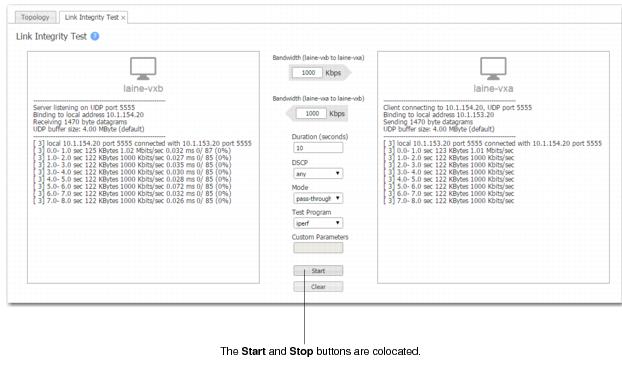Used for debugging, the link integrity test lets you measure the throughput and integrity (amount of loss) of your WAN link. You can run either iperf or tcpperf (Version 1.4.8).
|
n
|
Custom Parameters are available for tcpperf and should be used cautiously, by advanced users.
|
|
server: Run tcpperf in server mode (not applicable for file generation). Listens on TCP port 2153 by default.
|
|
|
client server_IP: TCPperf Server's IP address (not applicable for file generation).
|
|
|
4
|
|
ip6. Forces tcpperf to use IPv6 addresses only. Default is IPv4 addresses.
|
|
|
interface IP: Specify source interface IP address. Default is any.
|
|
|
outname: Output filename. Default is stdout.
|
|
|
update <secs>: Frequency of printed updates in seconds. Default is 1.
|
|
|
duration <secs>: Set maximum test duration in seconds. Default is infinite.
|
|
|
wait <secs>: Wait until <secs> since 1970 before transmitting data.
|
|
|
realtime: Elevate to realtime priority. Requires root privilege.
|
|
|
cpu mask: Specify CPU affinity. Requires root privilege.
|
|
|
tcpwindow. TCP window_size. Default is OS default.
|
|
|
tcpmss: TCP mss. Default is OS default.
|
|
|
tcpnodelay: TCP nodelay option. Default is nagle enabled.
|
|
|
tcpquickack: TCP quick ack option. Default is delayed acks.
|
|
|
tcpdscp <cp>: Sets IP DSCP to <cp> (decimal). Default is 0.
|
|
|
tcpretries <n>: Sets number of times to retry TCP connections.
|
|
|
tcppace <n> [mode]: Pace TCP connection setup rate. Limits number of half-open connections to <n>.
|
|
|
tcpabort: Sends RSTs instead of FINs on close.
|
|
|
tcpfindelay <secs>: Time to wait after all data sent before sending FIN/RST
|
|
file. Source filename to load. Default is 10MB of random data.
|
|
|
test id <i>: Set test ID. The same test ID produces the same data set. User different test IDs to generate unique data for each test run. Default is zero.
|
|
|
number <n>: Generate <n> flows. Default is one.
|
|
|
begin <byte>: First byte in transmission. Default is zero.
|
|
|
end <byte>: End byte in transmission (number of bytes to transmit). Default is file size.
|
|
|
antipat <mode>: Antipattern mode: default is mutate:
none. Repeats same content verbatim on all flows. Repeats content if end byte exceeds content size.
mutate. Ensures all flows and data repeats are unique. Preserves short range patterns within flow. Destroys cross flow similarity. Destroys original byte code distribution.
shuffle. Ensures all flows and data repeats are unique. Preserves short range patterns within flow. Preserves cross flow similarity. Preserves original byte code distribution.
fast. Ensures all flows and data repeats are unique. Does not preserve short range patterns. Destroys cross flow similarity. Destroys original byte code distribution. Uses less CPU than mutate or shuffle.
|
|
|
loopback [mode]: Loopback. Default is unidirectional.
uni. Unidirectional client to server.
rev. Unidirectional server to client.
bidir. Bidirectional, client and server independently send data on the same TCP connection.
bidir2. Bidirectional, client and server independently send data on secondary TCP connections.
loop. Bidirectional, server loops data back to client on the same TCP connection.
loop2. Bidirectional, server loops data back to client on a secondary TCP connection.
bidir2. Bidirectional, transmists one transaction at a time. Client waits for previous transaction to be echoed. Emulates transactionals data.
2. loop2 and bidir2 modes 2 x <n> TCP connections and requires that the server has even-numbered ports available.
|
|
|
rate <bps>: Limits aggregate transmission rate to <bps>. Default is no rate limit.
|
|
|
trans <min> [max]: Sets size of each socket transaction. Default is 64000.
|
|
|
verify <mode>: Verify integrity of received data. Default is global.
none. No verification. Fastest/least CPU load.
global. Single global hash per flow. Fast, but cannot isolate an errored block.
literal. Literal comparison of data upon reception. Fast, can isolate errors to the byte level. Requires that server has same content as client. Use random data gen or same -f file at server.
embedded. Embedded hashes every 4096 bytes. Slower, can isolate errors to 4096 byte block.
|
|
|
repeat <n>: Repeat each content byte n times. Default is 1 (no repeats).
|
|
|
corrupt <n> <m> <s> [<%change>[<%insert>[<%delete>]]] : Corrupt 0 to n bytes of data every m bytes using seed s. Delta bytes will require 0.5*n/m percent overhead. Each corrupt may be a change, insert or delete with the probability of each being specifiable. The default is 33.3% changes, 33.3% inserts, and 33/3% deletes.
|
|
|
excerpts <b> <e> <l> [s]: Send random excerpts of average <l> length bytes from content between <b>egin and <e>nd bytes. The -b and -e options still specify total bytes to send. Uses random seed s.
|
|
|
s% specifies fraction [50%] of s-type content (short term reducible).
m% specifies fraction [30%] of m-type content (medium term reducible).
l% specifies fraction [20%] of l-type content (long term reducible).
|
|
|
version=2|3|t10|t11|t12. Set the protocol version.
cipher=OPENSSL-CIPHER-DESC. Set the choice of ciphers.
ticket=yes|no. Enable/disable session ticket extension.
cert=FILENAME. Use this certificate file.
key=FILENAME. Use this private keyfile.
compression=none|any|deflate|zlib|rle. Set the compression method.
sslcert. Print the SSL certificate in PEM format.
sslkey. Print the SSL key in PEM format.
|

